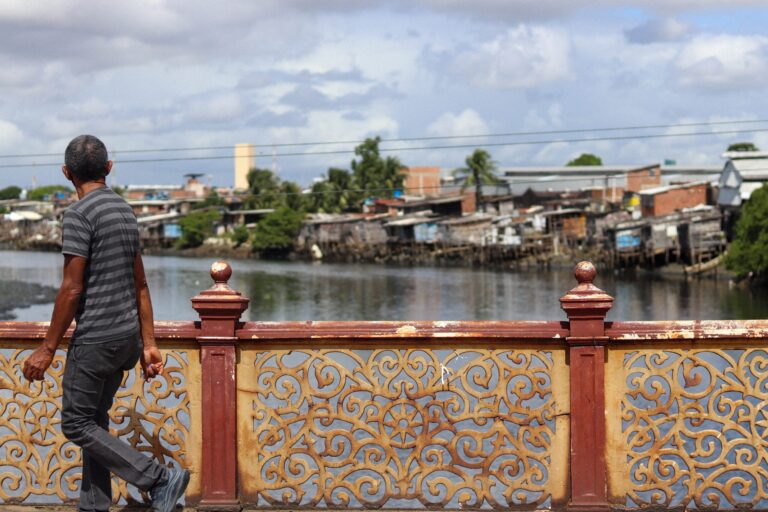Baixada Santista resumes training in adapting to climate change
The training intends to support local agents in understanding climate vulnerabilities and planning actions to adapt to climate change.
The climatic emergency is a phenomenon that affects territories as a whole and, especially, coastal areas, which suffer intensely with circumstances such as rising sea levels and changes in precipitation regimes, generating extreme events of waves, storms and undertow. These events contribute to the increase in the occurrence of floods and landslides and directly damage the ecosystems and biodiversity of the territories, impacting the quality of life of the local population.
Seeking to help the cities of Baixada Santista (SP) to strengthen urban resilience in the face of the climate crisis, the technical training project on “Adaptation to Climate Change with a focus on Water Resources” was resumed in June this year, an initiative coordinated by CETESB – Environmental Agency of the State of São Paulo, with support from FEHIDRO – State Fund for Water Resources; the Baixada Santista Hydrographic Basin Committee; and executed by WayCarbon in partnership with ICLEI South America.
Started in November 2019, the training aims to support public agents and civil society in the region in understanding local climate vulnerabilities and in planning actions to adapt to climate change. In March of the following year, however, the project was interrupted due to an extreme weather event that hit the region, causing floods, landslides and deaths. Shortly after this tragedy, quarantine was instituted in the State of São Paulo to fight the Covid-19 pandemic. In early June 2021, training activities were resumed virtually.
Collective mapping of climate events and lessons learned in Baixada Santista carried out during training
Throughout the training, participants have been accompanied by technical advice on the development of projects and actions that can be financed and on how to access them, seeking to increase local resilience and adapt the region to the impacts of climate change.
Advisor to the Presidency of CETESB, Maria Emília Botelho states that the training is providing a joint search for solutions, as well as a reflection on local vulnerabilities.
“Over the past two years, catastrophes and accidents that have occurred due to extreme weather events have shown that we must work more on prevention actions. Baixada Santista is highly exposed to various climate risks and, being a conurbated region, the problems and solutions are similar, and the impacts aggravated by climate change go beyond the municipal limits”, observes Botelho. “The course is fundamental because it brings the possibility of exchanging experiences between municipalities and the discussion of regional projects, making clear the interdependence and the need for urgent solutions.”
Role of ICLEI
ICLEI América do Sul is one of the implementing partners of the project, being responsible for preparing and conducting the training practice, developing exercises on interactive platforms in order to improve the participants’ knowledge on the topics covered.
According to Liz Lacerda, ICLEI South America’s Resilience Regional Coordinator, the opportunity for collective construction promoted by this training addresses a good part of the region’s challenges, providing identification and strengthening of local and regional governance bodies in the appropriation of the climate agenda and related plans, programs and projects on a regional scale.
“A number of initiatives and projects on the climate agenda have not reached their full potential due to factors such as institutional instability, insufficient number of servers dedicated to the agenda, lack of integration between portfolios and the need for greater specialization on adaptation and resilience agendas. ”, reflects Lacerda. “The lack of knowledge about the process of attracting and accessing financial resources to implement preventive measures was also identified as a barrier to the implementation of adaptation measures.”
The Baixada
The Baixada Santista unites the municipalities of Bertioga, Guarujá, Santos, Cubatão, São Vicente, Praia Grande, Mongaguá, Itanhaém and Peruíbe and has about 1.8 million inhabitants, in addition to an expressive floating population. It stands out for the vast presence of the Atlantic Forest, which make up a complex and sensitive ecological system, and also for its economic importance, with the Industrial Park of Cubatão and the Port of Santos, the largest and most important port complex in South America.
Eliana Ferreira, Planning Secretary of Praia Grande, believes that the training enriches the framework of options for dealing with climate impacts, bringing the issue closer to the territory’s daily reality. “Climate issues are not encapsulated by borders or limits, and the debate for the alignment of regional measures is essential to leverage the actions of municipalities.”
As for Maurício Sanches, the Peruíbe Planning Secretariat’s server, the training helps to standardize views on the need to confront climate change and presents possible solutions to be achieved with the available resources. “There is a great challenge to be overcome by everyone, given the rise in sea level and the runoff of rainwater. The regional economy is extremely interdependent and the local impacts directly reflect on several municipalities in the region; likewise, solutions adopted in one municipality tend to be successfully replicated in neighboring municipalities.”








